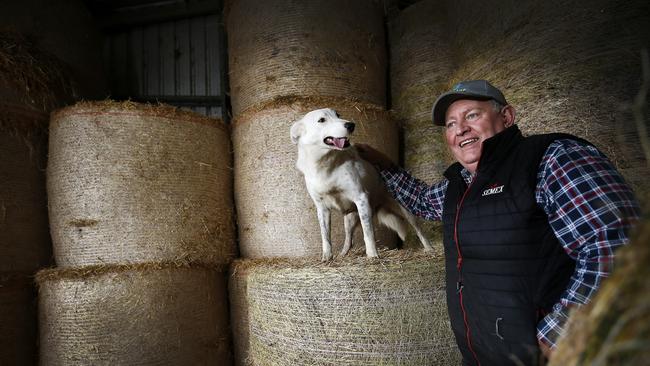Talking Point: Farm critics rub salt into wounds
JAN DAVIS: Drought-hit farmers bear an unfair burden of expectation.

Opinion
Don't miss out on the headlines from Opinion. Followed categories will be added to My News.
TASMANIAN farmers sent hundreds of semi-trailer loads of feed to the mainland last year to help colleagues facing the impacts of prolonged and devastating drought.
Now many are facing their own catastrophe, with feed prices climbing and rainfall in some areas yet to even reach the lowest on record.
The worst hit are farmers on the East Coast where dry conditions have been unusually persistent.
The East Coast is always dry, but for the past five years some areas have had less than half the usual annual rainfall.
Records show 2014 was the driest in 118 years across the state, with the East Coast hit harder than other areas.
We usually get an autumn or a spring break but this year there has been no relief. The dry has just hung on and on.
So far this year, the pattern of above-average rain in the west and below-average rain in the east is very similar to that seen last year. To make it worse, mean maximum temperatures have been well above average near the East Coast, with winter especially warm for the time of year.
As the national media spotlight turns on farmers and the way they manage drought, it is clear the public simply don’t understand how well prepared farmers were for this and how extraordinary the circumstances are.
There is much speculation in the media that farmers should have been more organised, they should have prepared for this better, there must be ways that they can drought-proof farms. This just rubs salt into the wounds.
Some of the commentary recently around animal welfare issues and the options that are in front of people who have been in long-term drought shows a lack of understanding about the money and effort that go into keeping the land, resources, water, plants and animals in the best possible condition.
Many farmers have survived horrendous conditions in recent years — and those who have remained in business are the best of the best on an international level. You’re not still farming in 2018 unless you are excellent at what you do. A farm can be drought-proofed for a certain time but nobody can drought-proof indefinitely. And no one has a crystal ball as to when it is going to rain.
Yet agriculture continues to be asked to shoulder a greater environmental stewardship load with little reward. Farm businesses do not want to be relieved of their environmental responsibility, they just want more effective and fairer ways to tackle some of the issues that are often driven by others who do not have to wear the costs. For some businesses, these environmental policy shifts are challenging enough, but when you consider the cumulative impact of government policies across portfolios the challenges become even greater.
For example, add to the above the cost of electricity and water — the enablers of intensified, high-yield and high-quality production — which are not a “fair cost” for many agricultural industries. As trade-exposed price takers that receive the second lowest level of support in the OECD, farm businesses have virtually no ability to offset these costs.
Individually, each policy reform may seem reasonable. Collectively, it is a very different picture. Throw in the long-running drought and low commodity prices due to supermarket price wars and market manipulation by foreign governments, the cumulative impact of government policies become insurmountable and they are challenging the profitability and viability of many farm businesses across the state.
However, farmers are not all welfare cases who need handouts. Many of them are modern, resilient and sophisticated businesses. And these farmers find the “poor victim farmer with starving stock” image distressing. They argue that, while this remains the predominant narrative, we can’t expect the urban population to respect what they do and support their ability to make good land management decisions.
Everyone agrees that current government responses to such circumstances are outdated; that we need new approaches; but the time never seems to be right to have what is inevitably going to be a difficult discussion. So we really never come to grips with issues that need to be seriously considered in ensuring appropriate responses and preparation for drought and other natural disasters.
We must have a more holistic approach to policies affecting agriculture. Governments have repeatedly told farmers that they need to be better prepared for natural disasters. Perhaps it is time they heeded their own advice.
Jan Davis is an agribusiness consultant, a councillor on the Northern Midlands Council and a former chief executive of the Tasmanian Farmers and Graziers Association.


